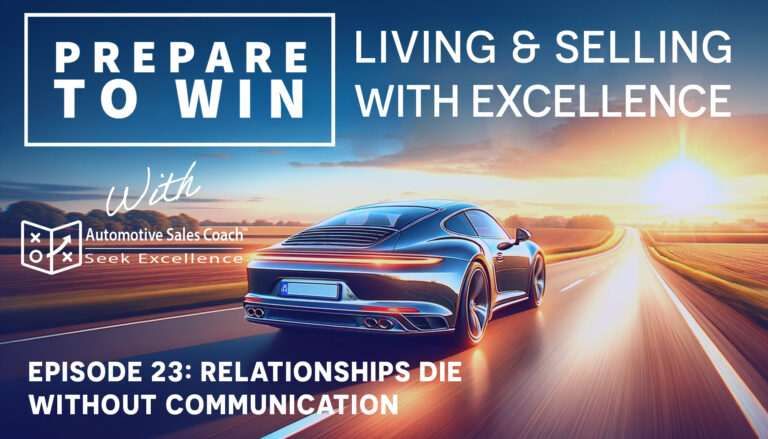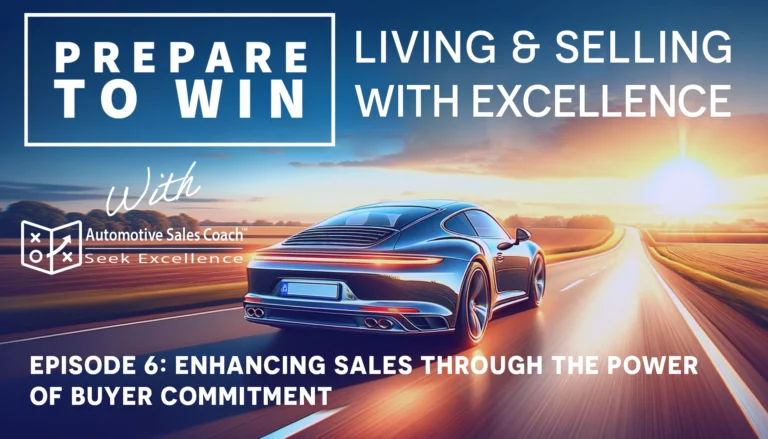Mastering Trust, Value, and Transparency
Do you find yourself constantly wrestling with price objections in your sales negotiations? Have you ever thought about why they seem to crop up all the time? It’s because objections are a feeling, not a fact, and the key to handling them well is understanding that. This episode is all about unpacking the psychology behind objections and providing practical strategies to navigate through them, especially in the car business. We delve into the three primary price objections: the price is too high, the payments are too high, and the trade is too low. And to help us navigate these treacherous waters, we’ll be referencing insights from our Dealership Playbook and Automotive Sales Coach Training.
But that’s not all! We also discuss the significance of empathy, logic, and value in your sales discussions. These elements not only justify the price to the buyer but also help them see the value of the product. After all, they’re at your dealership for a reason – to improve their lives, and it’s our job to guide them back to that purpose. Active listening is the cornerstone for achieving this – it’s the key to living and selling with excellence. So, buckle up and get ready to revolutionize your approach to price objections. Whether you’re a seasoned sales veteran or a rookie, this episode promises to be an enlightening journey.
David Lowe: 0:00
Welcome to Prepare to Win drive time Tips on living and selling with excellence. Today’s episode is going to be awesome. We’re talking about navigating price objections. Here’s what we’re going to do. We’re going to help you discover some proven strategies to handle a price objections effectively and close without compromising your profit margins. Stay tuned.
Grace Lupoi: 0:32
Alright. So, dave, now we’re talking about price negotiation. Right and objections are so common these days, especially when it comes to price.
David Lowe: 0:39
Right, and so we know it’s going to come right. It’s because buyers, really we know they have three fears, and one of them is paying too much. Nobody wants to pay too much.
Grace Lupoi: 0:47
I know I don’t.
David Lowe: 0:48
Right, and the way that we try to protect ourselves from paying too much is object. Ah, the price is too high, and in every sales industry they have that. In the car industry we have the price is too high, the trade is too low, the payments are more than I expected, right, and so are we prepared for that. That’s really today’s episode, talking about some real things we can do to effectively handle these and keep our profit margin right. So this, really this episode, builds on last episode and if you’ve joined us for last episode, hopefully you’ve downloaded our one pager. We have them all the time you can download after an episode. If you want to say I’d like a recap of what was talked about today, you can download it and in it we have some of the key points and the takeaways, right? So in the last episode we really talked about conquering, negotiating, kind of setting the stage for a win-win agreement and the principles I’ll quick go over and these are included in your download, if you download, so you can refresh yourself Relationship and trust, building value and creating desire, resetting trade and price objections if you’re in the car business gaining, committing transparency and overcoming price objections, and that’s why we’re following up last week’s episode with this one right, so let’s get into it. I think the first thing is what is an objection?
Grace Lupoi: 2:13
What is an objection? What is it?
David Lowe: 2:16
Yeah, it’s a feeling, it’s not a fact. An objection is I don’t want to pay too much, and so an objection is a reason for not moving forward. That’s all it is. I’m not going forward because of this reason, and it’s usually based on a feeling. So in the car business we use market driven numbers and the buyer uses feelings I always hoping for. I do when I’m buying something.
Grace Lupoi: 2:41
I’m the same way.
David Lowe: 2:42
Why wouldn’t they right? So I think, going back and just saying we’re not going to get in depth on objection training on our dealership playbook and automotive sales coach Facebook page and prepare to win site, we have a lot of information around, you know, because obviously objections are a big part of selling right. And I do want to just review a couple things, though, to set the stage for our price negotiations and overcoming objections during them, and one of the things is that objections really are three. There’s threefold there’s product objections that’s right. There’s postponement not today. And then there’s, of course I’m buying it but I’m not going to pay that Specifically. That’s what we’re talking about today, and typically they present themselves in a similar fashion. It doesn’t matter what you’re selling. You’re probably hearing the same type of price objections over and over. The cool thing about that is that means you can be prepared. So to overcome a price objection. First of all, we got to be prepared. What is going to happen and why is it happening? That’s really critical. That’s the whole point of the dealership playbook is to prepare salesmen. And, by the way, if you do those principles we talked about in the last episode, you are so much more prepared in the moment to overcome your buyer’s fears of paying too much, what we call price objection. And close, we call it a first pencil. Close, which is without negotiating numbers, right and so, all right. So there’s three types of price or three types of objections product postponement and price. And in the car business, we really see three main Price objections. Right, what are they?
Grace Lupoi: 4:20
got the price objections. Just the overall car yeah, right, payments yeah, and then trade of course.
David Lowe: 4:25
Right, the price is too high, the payments are more I can afford, and boy, that’s not enough for my trade, right, it’s almost like we’re programmed to say that as a buyer, all right, and in the past we’ve always had to do that To get a fair deal. Now the internet has changed the, the pricing models and we’re gonna cover that in future episodes and and how to set the stage for that. We talked about it in the last episode a little bit with resetting their expectations on price and discount, all these things kind of Fit together, don’t they? All right? So the buyer says to us that price is too high? Right, it’s one of those things, or whatever. So how do you effectively overcome that? Well, you just said an objection is a what, it’s a feeling, right? So what should we do?
Grace Lupoi: 5:13
first, Well, the first thing, we let them know that we heard them right. I let the you know that, hey, just because I’m a consultant does not mean we don’t have the same feelings. I get it on the same way. I think, leveling with them a little, letting them know that we’re the same right, we’re two different people and we’re also human. At the end of the day, we all have the same feelings.
David Lowe: 5:30
That’s right, and don’t we? All of us don’t want to pay too much and all of us see the price for what we want to buy and like, oh my gosh, that’s more than I thought it was gonna be right. So what you just said was let’s talk to the heart first. I hear you, I understand you, you know what I felt that way before. Now, some of you that have been in the game for a while might realize the feel felt, found, turnaround that I just used Right. This has been around for hundreds of years. We didn’t create. I don’t know who did it. I know how you feel. I felt the same way. Let me tell you what I found. We use a version of that in the playbook, an updated version of that, and I know how you feel is Is really called empathy not sympathy.
Grace Lupoi: 6:13
Sympathy says hey, you’re right.
David Lowe: 6:15
Yeah.
Grace Lupoi: 6:15
I agree with you yeah empathy says I understand you.
David Lowe: 6:19
So we’re giving definitions in a selling situation. Of course somebody says, yeah, that is too high, I wouldn’t pay it either, and everything says right.
Grace Lupoi: 6:29
I know how you feel.
David Lowe: 6:31
I’m the same way. We all feel that way. So a strategy for overcoming a price objection and maintaining your margin has to include slowing down and absorbing their feelings, listening to them with your heart and let them know, boy, I hear you and I understand you. I’m also gonna let them know. It’s okay, if I’m smart, I’m gonna say don’t worry about it, because if they like me, some people feel bad about bringing that up. You know what I mean and they, they don’t like conflict if they like you and so they may bring it up, and maybe a very hard way. They could be a harsh with you. So, but we would agree first thing, absorb the feelings, feelings right All by and I think we talked about this in the last episode a percent of motion, 20% facts. This is how I feel we’re gonna change how they see things, how they think about things, how they feel about things with Facts. But the first thing is we have to acknowledge I hear you, I understand you. This is critical, can I tell you. I think it’s the most critical mistake that salesman make today in any industry any industry. They jump right to just the facts, ma’am, right, right by the price to hot, yeah, but, and that was. It’s like playing ping-pong You’re both trying to score on each other. That’s not win-win. What we want to do is help bring the buyer to our point of view. That’s what selling is. Then we covered that in the first episode. Right selling is is helping someone see your point of view and take action. That’s really all it is. I can’t get someone to really listen to my point of view if they don’t feel like their point of view is understood. Right, right. So Stephen Covey’s habits seek first to understand, then to be understood, of course, which goes all the way back to Solomon, he who answers a matter before hearing it is his following shame. We’re teaching you the principles of living and selling with excellence that have always existed, and you see them throughout the centuries. All right, so let’s get back. We’ve got empathy, right. I hear you, I feel you, I understand. So we’ve talked to the heart. Now what?
Grace Lupoi: 8:36
Now I can talk to their brain.
David Lowe: 8:37
I can talk to the brain, right I’m gonna use some logic.
Grace Lupoi: 8:39
Let them know. Here’s why the payment is the way that it is. Here’s how we came up with that Right. Right, talk to your heart, make you feel open to hearing my side, and now I share my side in a way that still makes them feel like I understand them.
David Lowe: 8:52
Yeah, that’s awesome. So subconsciously, their brain is saying, yeah, you may, okay, you might feel good about this, but no, we said we wouldn’t do this right. So the brain is telling them no. The logic is saying, yeah, but that’s stupid right, and we wanna let them know it’s not Once we go talk to their feelings. When we talk to the brain, it’s logical actually. So we call that step in our training logic. You can call it whatever it is. Some people have called it justifying the price. I don’t know if I like the terminology. I think we can update it and say that we talk to the heart. Then we talk to their head empathy and logic and we can explain how our pricing structure, how we we call it competitively low but in your industry who knows how you call it? But we talk about how we ensure we offer you a great product at a great price. Right Logic is critical to that, isn’t?
Grace Lupoi: 9:42
it Absolutely, it definitely is about that.
David Lowe: 9:44
Let me tell you a story from I’m looking for a motor home. I go to see this motor home and I kinda liked it. It wasn’t what I was looking for, but I found it like, hey, this might be the right one. So I said to the guy what’s your best price? Isn’t that normal, right? And here’s what he said, his logic statement. Well, we just got it in. I’m not giving it away. If I don’t make a lot of money on it, I’m not gonna sell it. Now, what did that do to my heart and my mind? It destroyed it. He told me a story. It’s just a bad story, right, right. So we’ve gotta have logic is really the story of pricing. And when somebody tells us a bad story, we feel bad. We feel bad. When you tell a good story, a logical story, people can say you know what. That makes sense. That’s the point of logic. So we have, we’re saying that when we get a price objection, there’s kind of a formula, isn’t there?
Grace Lupoi: 10:43
Absolutely.
David Lowe: 10:44
So the formula is not what most people do. They start splitting the difference or going down, right. We’ll talk about that in a different episode. But that’s not. The strategy is to start to discount. The strategy is to show what I hear you understand empathy. The strategy is to give them a logical reason to say yes, right, but it doesn’t end there, does it?
Grace Lupoi: 11:07
Absolutely not.
David Lowe: 11:08
Once we tell them hey, I hear you and here’s how we priced it, so you can, it’s a good price. I have confidence in it, so should you. And now what?
Grace Lupoi: 11:16
We redirect them.
David Lowe: 11:17
Yeah.
Grace Lupoi: 11:18
And I think this is where we come into. We know that most buying decisions are emotional. We talked about how 80% of them are emotional. 20% are logic. Right now, they’re trying to take a logical approach and so, instead of logic, I’m gonna bring back in the emotion. Remind them. Here’s the whole package and here’s why this makes your life better. Whether I’m buying a TV, buying a car, buying a home, no matter what it is, this product makes your life better.
David Lowe: 11:43
Let’s bring back the emotion to it why they’re here to begin with. So we call this redirecting back to value. The whole package right Now. Part of that value can be logical. In a new car, it could be that warranty is gonna save you money. That’s logic and emotion combined, it’s both and that’s value, right. So you’re saying we’ve got this empathy. I hear you, I feel you, I know how you feel and we’ve got this logic. You can believe in the number, because it wasn’t random, right, it was a thought out. It makes sense. I believe in it. You should too. And let’s talk about what you’re getting for your money. That’s called value. We’re gonna have an episode on value and you’re gonna hear that throughout. Prepare to Win episodes. Value, value, value. Today, a lot of salespeople have fallen for the lowering of price as a way to close a deal, Not just in the car business, but every time I buy a guitar, I notice that. Or music, we see it all over All the time. Right, and you guys?
Grace Lupoi: 12:45
I’m the same way, same way, right.
David Lowe: 12:48
So we wanna train ourselves to be better than that. And to be better than that, we’re gonna show empathy. We’re gonna have a great logic story, tell the story of pricing and then we’re gonna help connect our buyer back for the whole reason they’re here and it’s lifestyle. They want the product for a certain reason. They decided to come get the product because of what it would do for them. Right, need, want love, whatever. But we know it’s a lifestyle and it fits who they are. Right, we talk family, work and play. How is it gonna improve their lives? So our third step, of course, is reconnecting them to the purpose of them being here, why they want the product. And we can go in. There’s so many pieces to this value story that we’re gonna do an episode on it. Don’t wanna spoil that, but I’m gonna tell you, if you want a formula for overcoming price objections and closing first pencil or holding your margin in another industry, then you want empathy, you want logic and you want to remind people of value. True.
Grace Lupoi: 13:50
Absolutely.
David Lowe: 13:51
All right. So once we’ve done all that, we get them back connected and emotionally they’re back connected to why they’re doing this. To begin with, they see the value this is what I’m getting for my money and when value exceeds price, they’re ready to go. Now. What do we do then? Cause so many people will. Just, they will present or make a presentation and stop.
Grace Lupoi: 14:12
Right, we’re not gonna stop there, we’re not gonna stop.
David Lowe: 14:13
So finish this formula up for us what do we wanna do?
Grace Lupoi: 14:16
We’re gonna reassure them. Right, we’re gonna use our relationship that we’ve already built over the last however many many minutes or hours right, reassure them. Hey, you’re getting a great deal, this is a great package for you. And then, of course, re-ask them at the original number. That’s right, take action. We’re the ones leading the sale, we’re the professional consultants. Right, I’m not gonna stop there. I’m gonna give my spiel and then move forward with the process.
David Lowe: 14:39
Isn’t that so important? So I think it’s like running a race, jumping a hurdle and stop running right. So as we hit objections, we jump them and we keep running to the next one right Until we cross the finish line. And I think, when I overcome, when I work on a price objection, a feeling, when I do it properly and I build value, it’s time to step back and say listen, I think it’s a great value for you, a great package, a great price. However you wanna put it, you wanna look them in the eye and reassure them. I believe Can I tell you something Confidence is contagious.
Grace Lupoi: 15:13
No contagious.
David Lowe: 15:14
And when I look them in the eye, I say this is a great thing for you. That’s gonna help. If you’re listening to this and not seeing the video, you see me shaking my head, right, If you’re on video, but you won’t see that if you’re just listening to it. But I’m shaking my head up and down as I do it. I am gonna reassure them. People need that. I feel like I do. Sometimes I’ll ask a waiter hey, I was thinking about getting this, Is that any good? Now, what a crazy question to ask. What are they gonna say? No, the food sucks you, right. So it’s a stupid. But I really want an excellent choice, right?
Grace Lupoi: 15:50
That’s what I wanted to say.
David Lowe: 15:51
Make me feel good. Reassurance is really a key. It’s that social proof kind of that we need to say you know what? I’m making a good decision and we can’t stop there. As you said, we gotta re-ask for action. I was told a long time ago that the buyer, no matter how good the deal is, will probably not take the pen out of your hand, and that’s probably really true, and so I need to put the pen back in their hand, metaphorically maybe physically right. Depending on what industry or whether. But I need to reassure them and then ask them so did you want me to wrap this up as a gift, or did you right If I was selling something over the counter? If I’m selling a car, then I would ask a different way, but I’m gonna re-ask for the business. And how much concession have I made? Zero, zero. So overcoming price objections and maintaining margin requires a plan, a proven plan. That’s why we call this Prepare to Win. See, you can’t win without a plan. What else do you need? You need a great plan, which we just gave you. What else do you got to have?
Grace Lupoi: 16:57
Preparation.
David Lowe: 16:57
Preparation. You better practice it Because, okay, now you have the what to do, put it in your words right, follow the set empathy, logic, redirect to value, reassure and re. What does that sound like, coming in your words from your industry? Right? And once you have that down, practice delivering it right. We know people hate video themselves. When it comes to their skill, they like video on themselves in front of you know, whether on vacation or in front of their dinner. But when it comes to right, but you know that’s a real benefit of practice is being able to video yourself, look at it and improve yourself. So we have the. The prayer to win requires you to have a game plan. We have that. You turn that game plan into skill through practice. And then what do you have to do?
Grace Lupoi: 17:42
Take action, you got to take action.
David Lowe: 17:44
You got to play with a band. We right we call it play with passion, and when I’m playing I really don’t think about what I’m doing, why I build my competence through practice. I have to trust my confidence when I’m in the game.
Grace Lupoi: 18:00
That’s the confidence right.
David Lowe: 18:02
That’s it. It moves too quick to think about everything I’m doing Now. If I haven’t prepared, then I’m going to think about everything that’s going to come off terrible. I’m going to you know, not professional, not skill that’s going to cost me money. However, if I get a great game plan and I practice over and over until I know I can do it and do it well, not just follow the outline, tell the stories, connect the stories to the person I’m in front of, personalize the value to them, if I can do all that, why would they say no? That’s what’s in my mind. Now I’m going to tell you something. This formula works and it’s going to help you. I bet you in the car business. We’ve watched at dealerships double first pencil closes, meaning that the buyers that said no to the first numbers say yes. Once you’ve gone through this, once you take this, play right, play number one or step number one, empathy logic redirect to value Number four, of course, we’re sure number five. Now we see buyers going okay, well, that makes sense. I’ll take it. We see it all the time. That’s more than I thought I was going to do, but you’ve done a good job.
Grace Lupoi: 19:06
I want the cut right.
David Lowe: 19:07
We’ll see a husband and wife said you know it’s right, honey, and they will discuss it and say yes, you see, you have just built a golden bridge for them to retreat on. This goes back to the art of war. Build a golden bridge. What we want to do is give them permission to say yes and you just given them that this will work. Play with passion.
Grace Lupoi: 19:31
Well, david, that kind of wraps up today’s episode right. Thank you guys for joining us. I really appreciate that. Of course, our goal is to continue to help you guys and ourselves be better today than yesterday. So if we’re a benefit to you, we’d love for you to like, subscribe, follow, write whatever we can do to continue just to serve you guys really well.
David Lowe: 19:46
That’s awesome. Thanks, Grace, Thank you guys for being with us. We appreciate it. As Grace said, and listen. The next episode we’re going to talk about the power of active listening. Right, the secrets. We’re going to help you uncover these secrets. Can I tell you something? The key to living and selling with excellence begins with listening. I can’t wait to the next episode. We’ll see you then.







